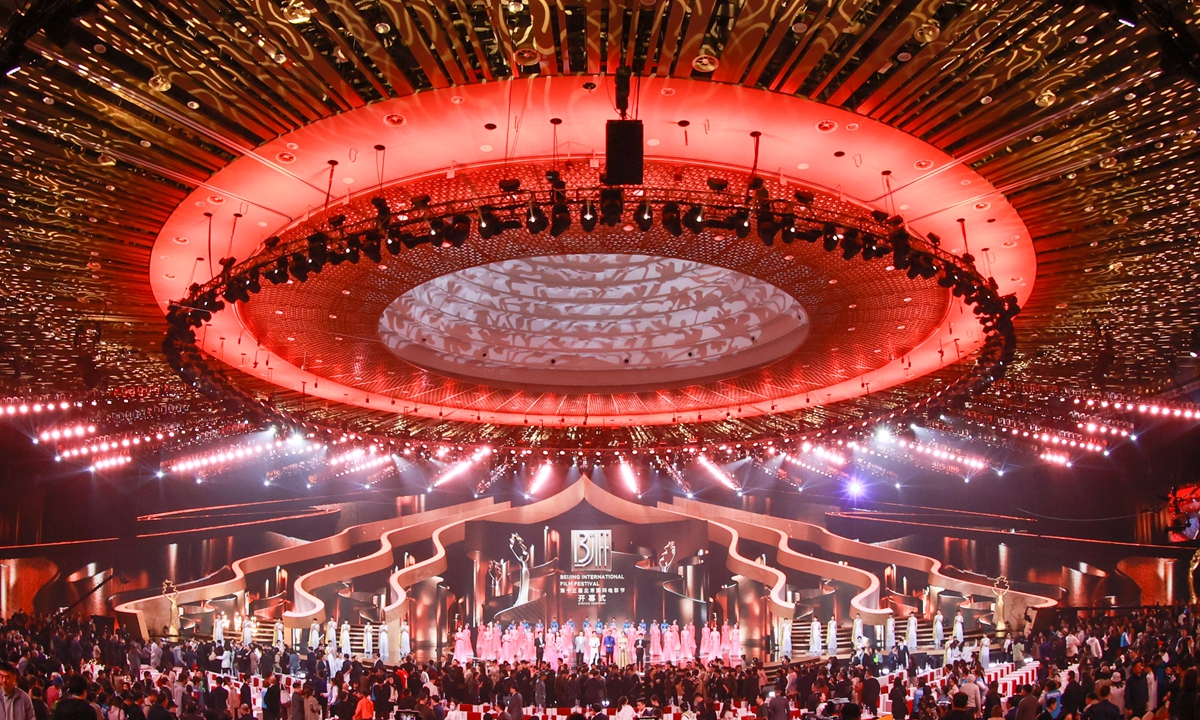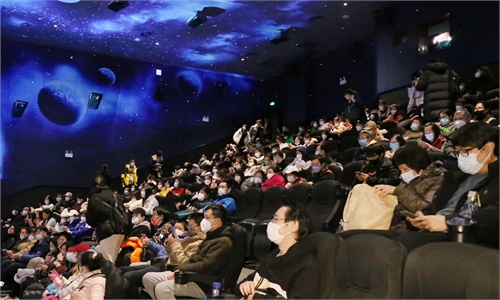ARTS / CULTURE & LEISURE
13th Beijing International Film Festival gathers filmmakers, fans to share common love
A joyous carnival

The opening ceremony of the 13th Beijing International Film Festival Photo: Courtesy of BJIFF
Editor's Note:
The 13th Beijing International Film Festival (BJIFF) is currently taking place in Huairou district of Beijing. It is the first international film festival in China to return as an in-person event since the country's COVID-19 response was optimized. The festival has excited movie fans and filmmakers worldwide, with moviegoers from all over the country traveling to Beijing to attend more than 300 events across nine major sections. Many are hailing the return, saying, "Our carnival is back!"
More than 200 guests from China and abroad have gathered to discuss topics such as using films to tell China's stories, deepening international cultural exchanges through films, and how the creative experiences of excellent filmmakers may spark artistic inspiration and answer the question of how to create "outstanding films" that represent China's national capabilities and aesthetics.
"Three, two, one…"
As soon as tickets for the 13th BJIFF started selling online, 26-year-old moviegoer Lukas Yan (pseudonym) skillfully started using his mobile phone and computer to carry out his ticket-grabbing strategy.
The veteran film festival-goer told the Global Times that he had arranged his schedule the night before and had successfully purchased 28 film tickets, stunning many of his peers.
Since the festival began on Saturday, Yan has watched an average of three to four films per day and has shared movie reviews on Douban, a Chinese reviewing website.

Photo: Courtesy of BJIFF
Media reported that tickets for many films released during the 13th BJIFF sold out within seconds, with A City of Sadness, A Moment of Romance, and 2001: A Space Odyssey topping the list of fastest selling tickets.
"This film festival is like the Spring Festival for us die-hard movie fans," Lukas said, adding that he was excited to watch some rarely seen films and others like Kung Fu Panda that he had missed seeing on the big screen.
The movie-watching craze has extended beyond Beijing to other places. Data shows that moviegoers from East China's Shanghai Municipality, North China's Tianjin Municipality, and Chengdu, capital city of Southwest China's Sichuan Province topped the list of non-locals who have come to participate in the film festival.
Villanelle (pseudonym) from North China's Shanxi Province told the Global Times that she had purchased 10 tickets, including one for the hit A City of Sadness, and had flown to Beijing to watch films she had always wanted to see on the big screen.
'The spring is coming back'
The 13th BJIFF is a great festival for both moviegoers and filmmakers after three years of intermittent disruption to film-going due to the COVID-19 pandemic. Renowned filmmakers' workshops and after-screen events have been fully occupied by passionate moviegoers. After a workshop and master class by Academy Award-winning German-Austrian film director Florian Henckel von Donnersmarck, Chinese moviegoers were seen waiting in a long line with excited faces to get the director's signature.

German-Austrian film director Florian Henckel von Donnersmarck Photo: Courtesy of BJIFF
Lukas was surprised to see some Chinese audience members using fluent Russian to ask questions to director Artyom Mikhalkov during the after-screening event for the Russian film Mister Knockout. The director enthusiastically shared his shooting experience with the audience.
Many filmmakers expressed their pleasure and joy at being able to communicate face-to-face with their counterparts after the pandemic.

French director Frederic Auburtin Photo: Courtesy of BJIFF
"It's very touching and overwhelming to be back in China after the 3-year-long pandemic," French director Frederic Auburtin told the Global Times, recalling that when he left China three years ago he was working as an executive producer on a film in Southwest China's Yunnan Province.
"The spring of films is coming back… Now I feel like everything is getting back on track," Chinese director Lu Chuan told the Global Times.
His film Beijing 2022, the official film of the Beijing 2022 Winter Olympic Games, premiered at the opening of the film festival and received high praise from the audience.
President of the International Olympic Committee Thomas Bach sent his congratulations to the film through a recorded video, calling the film festival a "perfect stage" to showcase the "thought-provoking documentary."
Guest of Honor: Thailand
Following Greece and Argentina, Thailand has become the Guest of Honor of the 13th BJIFF. This has made possible the Thai Film Week, one of the major highlights of the film festival.
Thai Minister of Culture Itthiphol Kunplome delivered a speech at the opening ceremony, stating that this marked the first time Thai filmmakers have joined the BJIFF and showcased Thai films. He pointed out that cultural exchanges through movies can better promote friendly relations between the two countries.
Under the China-proposed Belt and Road Initiative (BRI), the two countries have developed close cultural exchanges in film and television over the past decade.
More Chinese film crews are choosing Thailand as their shooting base. Chinese blockbusters such as Lost in Thailand, Detective Chinatown, and Operation Mekong were all filmed in Thailand and achieved both great box-office and critical success. Chinese director Chen Sicheng said at a forum that the third installment of the hit Sheep Without a Shepherd franchise would also be filmed in Thailand.
Thai films and television works released in China have also received wide praise from Chinese audiences. Media reported that from 2012 to 2021, more than 240 Thai TV dramas were introduced to China and Chinese video-streaming platform Bilibili currently has nearly 50 Thai movies. Thai romance film Love Destiny: The Movie was also released during Thai Film Week.
Additionally, to mark the 10th anniversary of the BRI, the Beijing Film Panorama presented a section "B&R Asian Vision LENOVO Special Presentation" sponsored by Lenovo. This section screened 10 of the latest films produced by countries along the ancient Silk Road, including Singapore, Vietnam, Indonesia and Mongolia, showcasing the rare creativity of Asian films.

A scene at the opening ceremony Photo: Courtesy of BJIFF
Increased exchanges
According to the BJIFF organizing committee, a record-breaking 1,488 entries from 93 countries and regions are competing for the festival's Tiantan Awards. Veteran Chinese director Zhang Yimou is serving as president of the jury, which will select 10 films from 15 finalists for the awards. These include Adiós Buenos Aires (Germany/Argentina), Ciao (China), Driving Madeleine (France), Scrapper (UK), and To Catch A Killer (US).
In addition to the main competition for the Tiantan Awards, the festival is also bringing more than 180 excellent foreign language films, many of which have also screened at international film festivals in Berlin, Cannes, Locarno and elsewhere.
Many foreign guests told the Global Times that such an international lineup of judges and rich films ensure the global vision and professionalism of the BJIFF, and also show the openness and inclusiveness of the Chinese film market. They mentioned that they have watched many excellent Chinese films and are eager for more international film exchanges.
Hiroyasu Ando, chairman of the 35th Tokyo International Film Festival, said that film exchanges between China and Japan have always been a two-way street. Currently, the Japanese anime films The First Slam Dunk and Suzume are showing in China and have received a warm welcome from Chinese moviegoers. He expects more cooperation in film-making between the two countries and the entirety of Asia.
"We are facing new challenges such as climate change and the pandemic, so human beings will be at the center of films in the future," Auburtin told the Global Times.
He said China could create more unique stories that touch people's hearts or stir the interest of people worldwide. Saying that China and France have a lot in common culturally, he expects more cooperation with Chinese filmmakers.
Russian director Ivan I. Tverdovskiy told the Global Times that with changes in the international situation, more filmmakers are turning their attention to China, the world's largest film market. He noted that some Chinese movies have clear national characteristics, which help him better understand the country. Sometimes he can even find resonance through details in the movies.

Russian director Ivan I. Tverdovskiy Photo: Courtesy of BJIFF
Tverdovskiy mentioned that China and Russia are friendly neighbors with a long shared border. In some places where the two countries meet, there must be many interesting folk stories and if given the opportunity in the future, he would like to make a Chinese-Russian film about transnational marriage. He believes that such folk stories can illustrate the high level of mutual trust and understanding between the two countries.




